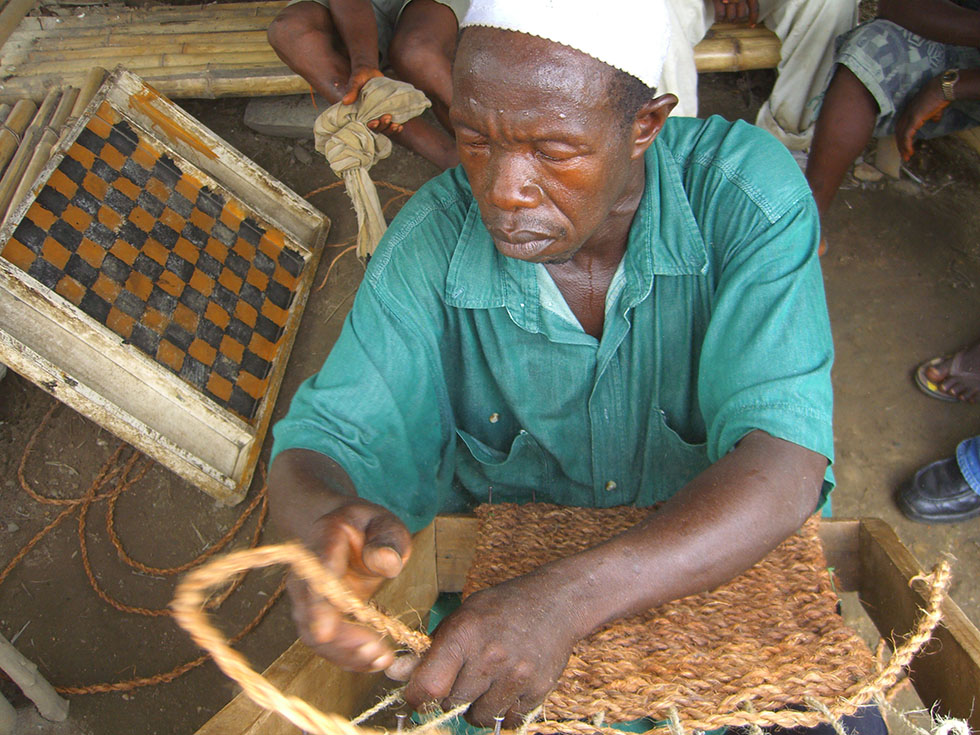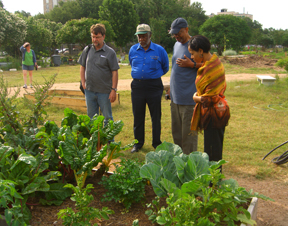Safe Drinking Water in Rural Villages
Despite the abundance of water from adequate rainfall, numerous rivers that flow year round and seasonal streams, the West African countries of Liberia and Sierra Leone suffer from a lack of safe drinking water, resulting in the prevalence of waterborne illnesses. This problem is particularly acute in rural villages where the infrastructure to treat and distribute water is totally absent. In recent years wells and hand pumps were installed in many villages, but over 70% of these facilities are now non-functional due to a lack of maintenance, repair and replacement parts. Local people were not trained to manage and maintain these facilities.
In the past two years, working with our partners in the West Africa Initiative (WAI) program, AMI has assisted 23 groups in rural communities gain access to safe drinking water by establishing or wells and hand pumps, serving over 6,000 families in each country. Water management committees comprised of WAI group members were established to ensure timely maintenance and repair in each location.
Yes, He Is Blind and Yes, He Is A Farmer
If you think a blind man cannot be a farmer, think again!! And meet Mohamed Maada Kabia, chairman of the Blind Farmers Association, located In Katik Village near Lunsar in the Port Loko District of Sierra Leone. Mr. Kabia was not born blind and his story, though unfortunate, is one of courage and survival during the time of the civil war in Sierra Leone. Before the war, Mr. Kabia and his wife led a typical rural existence – he a farmer and she a petty trader. The civil war came to their doorstep and in 1997 they, along with their neighbors, were forced to flee their village and take shelter in the thick forest along the banks of the Rokel River as the rebels advanced. The forest and river provided them with shelter and food, but was also the source of blindness for many, including Mr. Kabia.
Because of the war the control measures for black files that cause river blindness lapsed and the population of the flies exploded, biting and infecting many people who were in hiding along the river banks. By 1998-1999 many people starting experiencing eye problems, including this very man and in 2000 he finally became blind, as did scores of people in his village. Subsequently, his wife divorced him and moved on.
Mr. Kabia and many of his friends did not give up on life. Instead they formed the Blind Farmers Association and with the help of their relatives and youth the community, called backbenchers, they continued their farming activities. He will be the first to admit that he cannot engage in all the farming tasks, but he can do some chores such as weeding, planting and some harvesting. It takes him a bit longer, but he gets it done and he feels good about that. He also learned to weave mats which are sold in the local markets, remarried in 2013 and had his first child in 2015. “Life has changed and everything has changed for the better”, said Mr. Kabia.
The Blind Farmers Association was among the first to be admitted to the WAI program in 2008, providing the group with seeds and tools, leadership training of the members and their sighted supporters and financial and technical support. “Because of the WAI program, we are able to rise again and life has become meaningful once more”, one group member remarked. When asked about the benefits of the WAI to himself and the members of the group, Mr. Kabia rattled off a list that included increased farm production with excess food for the market, Moringa products for the entire community, microcredit program that increased peoples’ incomes, assistance in the fight against Ebola; but most of all Mr. Kabia said “are the training workshops conducted by the WAI programme that made us know the essence of unity/togetherness, group work, farming and business.
Mr. Kabia was one of two men to attend the Nutrition training workshop held in his community in November after which he remarked: “I learned a lot of things that will help my family. I do not know these things before. I will encourage the men to share the good foods with their wives and children”.

Study Sessions and Network Building
A critically important component of helping communities adapt to climate change is education followed by community advocacy. Low-income, poor, rural and minority communities are often without knowledge, organizational capacity and resources to effect change necessary to combat unfavorable policies and devastating events to rebuild. Through education and rural networking, AMI is facilitating the development of U.S. and global partnerships of equity focused organizations and institutions, to ensure that rural communities and small farmers are integrated into climate and environmental justice movements. Though convenings, intensive training, strategic partnerships, and participatory engagement of international and North American partners, AMI works to build an integrated network of rural people capable of giving voice to issues and policy targets that will further the social justice agenda of rural, agricultural, and environmental advocates.

West Africa Initiative
Over the past 10 years, the WAI program in Liberia and Sierra Leone has made significant progress in the building of local farmers and community organizations while contributing to improvements in the social and economic conditions in the lives of over 13,000 people in 50 communities. This is an indication that the goal related to the improvement of food security and the social and economic conditions was being achieved. The formation of functional farmers’ groups (primary groups)) at the village have been very successful and these groups have progressed to the stage where they are able to manage the implementation of projects within their communities. Clusters (of groups) or secondary level organization were formed, based on geographic proximity, to promote greater cooperation and sharing of resources.
WAI - Impact Assessment 2010-2019
WAI - Youth Agriculture Program Report
This report covers the second year of the community food security program supported by Growing Hope Globally (GHG), facilitated by the Presbyterian Hunger Program (PHP); and the Week of Compassion (WOC) of the Disciples of Christ. WOC also provided the support for the gender rights program. To maximize the use of human and financial resources, both the food security and the gender rights programs were implemented within the existing Youth Agriculture Program (YAP) of the West Africa Initiative (WAI). The WAI program is being implemented by Agricultural Missions, Inc (AMI) in collaboration with country partners - the West Africa Initiative of Liberia (WAIOL) in Liberia and the Village-to-Village Federation (V2VF) in Sierra Leone. Both WAIOL and V2VF are country based non-governmental organizations which are legally registered with the relevant public agencies. READ MORE here http://www.ag-missions.org/projects/ghg-wai-2022finalreport/

